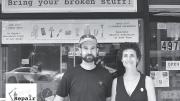In theater, “there’s never any funding, so you value things,” says Sandra Goldmark ’97. “When you make scenery, when you make props, when you make costumes, you understand the physical world and you’re used to caring about the history of objects and the value of objects.”
Goldmark and her husband, Michael Banta—she an assistant professor of professional practice in theater, he a production manager—both work as technicians in Barnard’s theater department. Yet even there, they found themselves tempted to comply with the all-too-frequent contemporary habit of discarding fixable items. In response, the couple devised an experiment driven by their ideals and their identity as theater people. Together they created a month-long business they called Pop Up Repair, to fix broken items brought into the shop, whatever they were. “I love working in theater. I love designing scenery,” Goldmark explains. “But there are times when I feel like I have to work directly on some of the bigger pressing problems and this project was a way to pull it all together.”
To spread the word, they offered several free fix-it workshops at local farmers’ markets. To raise funds, they set up an online campaign on IndieGoGo and raised $1,500 more than their $8,000 goal. They then secured a storefront in northern Manhattan and, motivated by the belief that no one can fix things as well as those who work backstage, they hired fellow theater folk as staff.
They also applied for and won Barnard’s Presidential Research Award, which they received two weeks before opening; Barnard’s vice provost called their project a “new and exciting look at repair as an underrepresented sustainability measure.” Goldmark says the research grant “allowed us to run the shop and ask some of the bigger questions.” Their research included weighing every item received for repair—and discovering that in one month they fixed, or tried to fix, more than one ton of recoverable objects.
Pop Up Repair was primarily a drop-off service. The broken items most frequently lugged in were lamps, chairs, electronic devices, and jewelry. There were oddball repair requests, too, like stuffed animals and a bra. How much to charge in relation to the time invested in fixing each item was a great unknown to the team: the learning process extended throughout the month. (In the end, repair prices s averaged from $10 to $40, Goldmark reports, which most people accepted.) The shop also offered free workshops on repairing books, musical instruments, and LCD TV screens.
Ever since the project closed its doors at the end of June, the couple have been analyzing the results from the month and the lessons learned. They are working on plans to open another New York shop next June and to achieve their long-term goal of opening Pop Up Repair shops in other cities, staffed by others. Goldmark says she and Banta were encouraged by their patrons’ response: the shop did begin a dialogue about consumption, she believes. “People don’t like the pattern. They don’t want to be forced to chuck their stuff.”
She credits her concentration in American history and literature with prompting her to think about the country’s relationship to consumption. “Part of the fun of this project,” she says, “has been the chance to connect the dots—to find the relationship between the way we live today and the way we have lived in the past. That’s ultimately what this is about, our values and the way that we take care of the things we have and what we choose to invest in.”








